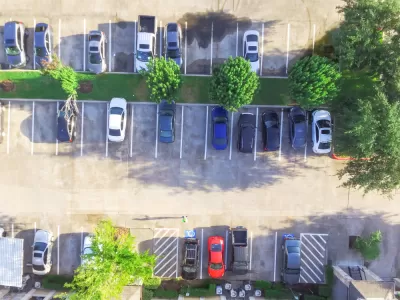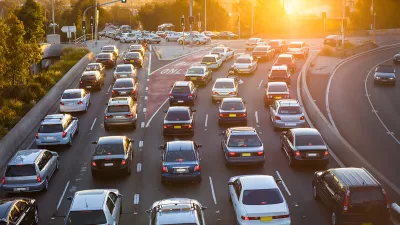New research published in the Urban Studies journal does the difficult work of connecting the dots between parking and driving.

A forthcoming academic paper offers a "breakthrough" conclusion, according to an article by Michael Andersen: "Bigger parking lots make us drive more."
"What Do Residential Lotteries Show Us About Transportation Choices?" was written by Adam Millard-Ball, Jeremy West, Nazanin Rezaeib, and Garima Desaib (from the Los Angeles and Santa Cruz representatives of the University of California system) and published by the Urban Studies journal. The methodology of the study required identifying and studying a randomized sample of human behavior, which the researchers found in, as explained by Andersen, "the free, site-specific lotteries that San Francisco uses to select who gets to live in the price-regulated homes of new apartment and condo buildings."
"After surveying the auto ownership and basic transportation habits of the residents of 2,654 homes in 197 projects built since 2002, the authors […] found that projects with more on-site parking induce more auto ownership," according to Andersen. More specifically, the paper reads as follows: "Buildings with at least one parking space per unit (as required by zoning codes in most U.S. cities, and in San Francisco until circa 2010) have more than twice the car ownership rate of buildings that have no parking…"
The research did not identify a correlation between parking supply and employment, but did identify a connection between parking and more riving, less transit use, and less walking.
After describing the methodology and findings of the research, Andersen also digs into the consequences of the findings, namely, that the research provides evidence that changing the way U.S. cities are built would result in the behavior changes that will lower greenhouse gas emissions to ensure the future of the planet.
FULL STORY: Verified: More Parking Puts More Cars on the Road

Planetizen Federal Action Tracker
A weekly monitor of how Trump’s orders and actions are impacting planners and planning in America.

San Francisco's School District Spent $105M To Build Affordable Housing for Teachers — And That's Just the Beginning
SFUSD joins a growing list of school districts using their land holdings to address housing affordability challenges faced by their own employees.

The Tiny, Adorable $7,000 Car Turning Japan Onto EVs
The single seat Mibot charges from a regular plug as quickly as an iPad, and is about half the price of an average EV.

As Trump Phases Out FEMA, Is It Time to Flee the Floodplains?
With less federal funding available for disaster relief efforts, the need to relocate at-risk communities is more urgent than ever.

With Protected Lanes, 460% More People Commute by Bike
For those needing more ammo, more data proving what we already knew is here.

In More Metros Than You’d Think, Suburbs are Now More Expensive Than the City
If you're moving to the burbs to save on square footage, data shows you should think again.
Urban Design for Planners 1: Software Tools
This six-course series explores essential urban design concepts using open source software and equips planners with the tools they need to participate fully in the urban design process.
Planning for Universal Design
Learn the tools for implementing Universal Design in planning regulations.
Smith Gee Studio
City of Charlotte
City of Camden Redevelopment Agency
City of Astoria
Transportation Research & Education Center (TREC) at Portland State University
US High Speed Rail Association
City of Camden Redevelopment Agency
Municipality of Princeton (NJ)





























